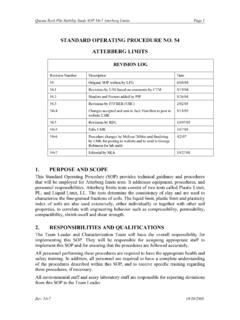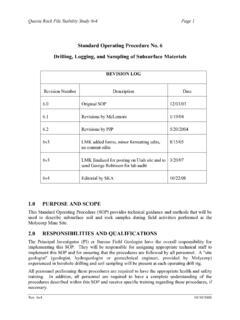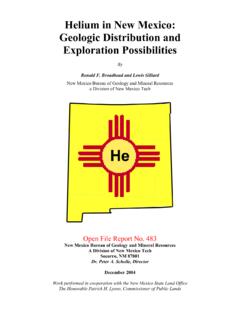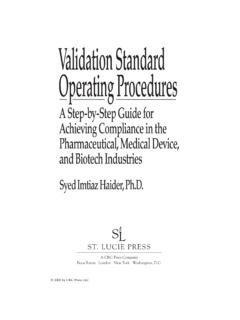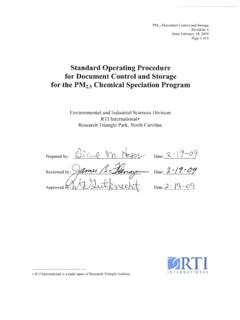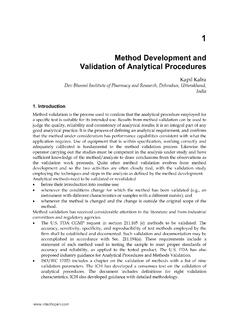Transcription of STANDARD OPERATING PROCEDURE NO. 30 ICP-OES …
1 Questa Rock Pile Stability Study SOP 30v8 Page1 Rev. 30v8 10/30/2008 STANDARD OPERATING PROCEDURE NO. 30 ICP-OES ANALYSIS REVISION LOG Revision Number Description Date 30v0 Original SOP (Bonnie Frey author) 02/01/05 30v1 Preliminary edits LMK 02/02/05 30v1 Comments-GMLR 02/10/05 30v2 Edits and comments LMK 2/21/05 30v3 Final edits, changes incorporated, LMK Sent to J. Hamilton and uploaded to Granite FTP server 3/4/05 3/4/05 30v4 Incorporated GMLR comments, 3/8/05 30v5 Incorporated GMLR comments (phone) and Bonnie Frey edits; Fixed gaps, reposted to Granite FTP, Resent to Jack Hamilton - LMK 39/05 30v6 Edits from Bonnie Frey, + edits by LMK 01/26/06 2/20/06 30v7 Further edits by Bonnie Frey and LMK Note: Send Bonnie these edits, then Hold until Bonnie finalizes before posting to Grannite and sending to Jack Hamilton 04/20/06 30v7 Finalized by LMK for posting to project website and to send to George Robinson for lab audit 3/29/07 30v8 Editorial by SKA 10/23/08 Questa Rock Pile Stability Study SOP 30v8 Page2 Rev.
2 30v8 10/30/2008 PURPOSE AND SCOPE This STANDARD OPERATING PROCEDURE (SOP) provides technical guidance and procedures for the analysis of solid and water samples by Inductively Coupled Plasma Optical Emission Spectroscopy ( ICP-OES ), specifically on a PerkinElmer Optima 5300 DV. This SOP addresses sample preparation, equipment used, laboratory and instrument procedures , personnel responsibilities, and quality control. The primary purpose for conducting metals analysis by ICP-OES for this project is because it provides a stable instrument that can handle complicated matrices of up to 5% dissolved solids as is expected for many of the Molycorp rock pile samples. A secondary purpose for analyzing these samples by ICP-OES is to screen them before trace element analysis that will be conducted by ICP-MS.
3 This screening process is necessary to prevent overloading the ICP-MS detector and to reduce the amount of maintenance required when analyzing high-solids samples. Analysis by ICP-OES will follow US EPA Method 6010 Inductively Coupled Plasma-Atomic Emission Spectrometry. Sample digestion will follow Briggs method (see References section). Any deviations from these methods will be noted in this SOP. Currently 39 elements are targeted for ICP-OES analysis. US EPA Method 6010b provides details for analysis of 30 of these elements: aluminum, antimony, arsenic, barium, beryllium, cadmium, calcium, chromium, cobalt, copper, iron, lead, lithium, magnesium, manganese, mercury, molybdenum, nickel, phosphorus, potassium, selenium, silica, silver, sodium, strontium, thallium, tin, titanium, vanadium and zinc.
4 The NMBMMR Chemistry Lab (hereafter referred to as the Chem Lab) has added the following elements for analysis by ICP-OES : bismuth, gallium, sulfur, tungsten, yttrium and zirconium. Boron, lithium, mercury and thallium are included in Method 6010b but will not be included in the Chem Lab ICP-OES analysis package. The following target analytes will be analyzed by ICP-MS additionally or instead of ICP-OES : arsenic, beryllium, cobalt, gallium, lead, molybdenum, nickel, rubidium, silver, tellurium, thorium, uranium, vanadium and the rare earth elements. Because of the volatile nature of silica during open-vessel digestion, no silicon analyses will be completed on solids by ICP-OES . Table 1 (Appendix 1) lists the target analytes, their wavelengths, their expected method detection limits (MDLs), and their plasma viewing positions.
5 RESPONSIBILITIES AND QUALIFICATIONS The Laboratory Manager, under the direction of the Team Leader and Characterization Team, will have the overall responsibility for implementing this SOP. They will be responsible for assigning appropriate staff to implement this SOP and for ensuring that the procedures are followed accurately. All personnel performing these procedures are required to have the appropriate health and safety training. In addition, all personnel are required to have a complete understanding of the applicable procedures described within this SOP and to receive specific training Questa Rock Pile Stability Study SOP 30v8 Page3 Rev. 30v8 10/30/2008 regarding these procedures , if necessary.
6 Personnel trained to use the Environmental Express HotBlock and the associated hazardous acids will undertake the procedures outlined in the sample preparation section of this SOP. Qualified personnel include the Chem Lab manager, lab technicians, and selected student workers. The Chem Lab manager and lab technicians will undertake the procedures outlined in the ICP-OES section of this protocol when conducting analyses on the PerkinElmer Optima 5300 DV. All environmental staff and assay laboratory staff are responsible for reporting deviations from this SOP to the Team Leader. data QUALITY OBJECTIVES This SOP addresses the following objectives in the data quality objectives outlined in the "Geological and Hydrological Characterization work plan at the Molycorp Questa Mine, Taos County, New Mexico : 1. To provide principle investigator (PI) researchers with quality analytical laboratory data that have been verified and validated.
7 2. To provide PI researchers with analytical data that have appropriate detection limits and that have been conducted in accordance with acceptable procedures . 3. To provide PI researchers with confidence that the data have been generated and transferred to the centralized database utilizing the procedures outlined in the project SOPs. RELATED STANDARD OPERATING procedures The procedures for providing analyses by ICP-OES set forth in this SOP are intended for use with the following SOPs: SOP 1 data management (including verification and validation ) SOP 2 Sample management (including chain of custody) SOP 5 Sampling outcrops, rock piles, and drill core (solids) SOP 8 Sample preparation (solids) SOP 15 Surface water and seep sampling SOP 16 Ground-water sampling SOP 22 Analytical data validation SOP 31 ICP-MS analysis SOP 36 Sample preservation, storage, shipping and custody SOP 68 Water analyses SOP 78 Humidity cell testing Questa Rock Pile Stability Study SOP 30v8 Page4 Rev.
8 30v8 10/30/2008 SOP 79 Humidity cell sample preparation EQUIPMENT LIST The following materials and equipment are needed for sample preparation and analysis by ICP-OES : Preservation of water samples: Dropper bottle filled with concentrated, ultra-high-purity nitric acid (HNO3) to be added by laboratory personnel 16 hours prior to performing the sample analysis. Briggs four-acid digestion for solid samples (hereafter referred to as the Briggs method) Environmental Express 36-well HotBlockTM SC100 Two 18-place polycarbonate racks for HotBlock 36 60-mL Teflon HotBlock vessels with caps Digital plastic coated temperature probe perchloric acid (HClO4) fume hood Milestone Duopur acid distillation unit Milestone TraceClean acid washer Ohaus Voyager balance accurate to four decimal places Stainless steel laboratory scoops Trace-element grade HNO3, HClO4, hydrofluoric acid (HF) and hydrochloric acid (HCl) Water purified to MOhm by reverse osmosis, hereafter referred to as RO water Safety gear (Safety goggles, lab coat, etc.)
9 Whatman ashless filters (grade 40) Polypropylene funnels Funnel holders 50-mL graduated centrifuge tubes 14-mL graduated centrifuge tubes 60-place plastic centrifuge tube rack National Institute of standards and Technology (NIST) STANDARD Reference Material (SRM) 2780 (Appendix 2), Hard Rock Mine Waste Molycorp Capulin sample 104, to be treated as an ongoing laboratory control sample STANDARD solutions for matrix spikes Laboratory notebook and indelible pens Analysis for metals and other cations PerkinElmer ICP-OES Optima 5300 DV Computer-controlled emission spectrometer with background correction Echelle grating optical system Radial and axial viewing capability Questa Rock Pile Stability Study SOP 30v8 Page5 Rev. 30v8 10/30/2008 Radio-frequency generator compliant with FCC regulations High purity argon gas Volumetric flasks and pipettes Ultrapure HNO3 and HCl RO water Single element STANDARD solutions, mixed calibration standards , calibration blank (for establishing calibration curve), method blank (used to identify contamination from sample preparation), initial calibration verification, continuous calibration verification, internal STANDARD (scandium), interference check solution, and spiking standards procedures Analysis by ICP-OES will follow US EPA Method 6010b Inductively Coupled Plasma-Atomic Emission Spectrometry.
10 Sample digestion will follow Briggs method. Any deviations from these methods will be noted in this SOP. Sample preservation and preparation Sample collection, preservation, and preparation techniques are critical for successful analysis on any laboratory instrument. For this reason, criteria in SOPs 5, 8, 15, 16, 36, 78, and 79 must be accurately followed and documented during sample preservation and preparation. Preparation of water samples Water samples must be filtered to less than um and preserved in the field by cooling to less than 4 degrees C within four hours of sampling. Lab personnel will acidify water samples to a pH less than 2 with ultrapure HNO3 16 hours before ICP-OES analysis (USEPA Method ). Acid preservation is not necessary in the field. Acid preservation will be done in the laboratory as described above.

